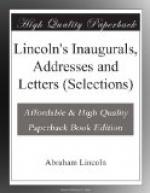Some of you delight to flaunt in our faces the warning against sectional parties given by Washington in his Farewell Address. Less than eight years before Washington gave that warning, he had, as President of the United States, approved and signed an act of Congress enforcing the prohibition of slavery in the Northwestern Territory, which act embodied the policy of the Government upon that subject up to and at the very moment he penned that warning; and about one year after he penned it, he wrote Lafayette that he considered that prohibition a wise measure, expressing in the same connection his hope that we should at some time have a confederacy of free States.
Bearing this in mind, and seeing that sectionalism has since arisen upon this same subject, is that warning a weapon in your hands against us, or in our hands against you? Could Washington himself speak, would he cast the blame of that sectionalism upon us, who sustain his policy, or upon you, who repudiate it? We respect that warning of Washington, and we commend it to you, together with his example pointing to the right application of it.
But you say you are conservative—eminently conservative—while we are revolutionary, destructive, or something of the sort. What is conservatism? Is it not adherence to the old and tried, against the new and untried? We stick to, contend for, the identical old policy on the point in controversy which was adopted by “our fathers who framed the Government under which we live;” while you with one accord reject, and scout, and spit upon that old policy, and insist upon substituting something new. True, you disagree among yourselves as to what that substitute shall be. You are divided on new propositions and plans, but you are unanimous in rejecting and denouncing the old policy of the fathers. Some of you are for reviving the foreign slave-trade; some for a congressional slave-code for the Territories; some for Congress forbidding the Territories to prohibit slavery within their limits; some for maintaining slavery in the Territories through the judiciary; some for the “gur-reat pur-rinciple” that “if one man would enslave another, no third man should object,” fantastically called “Popular Sovereignty;” but never




